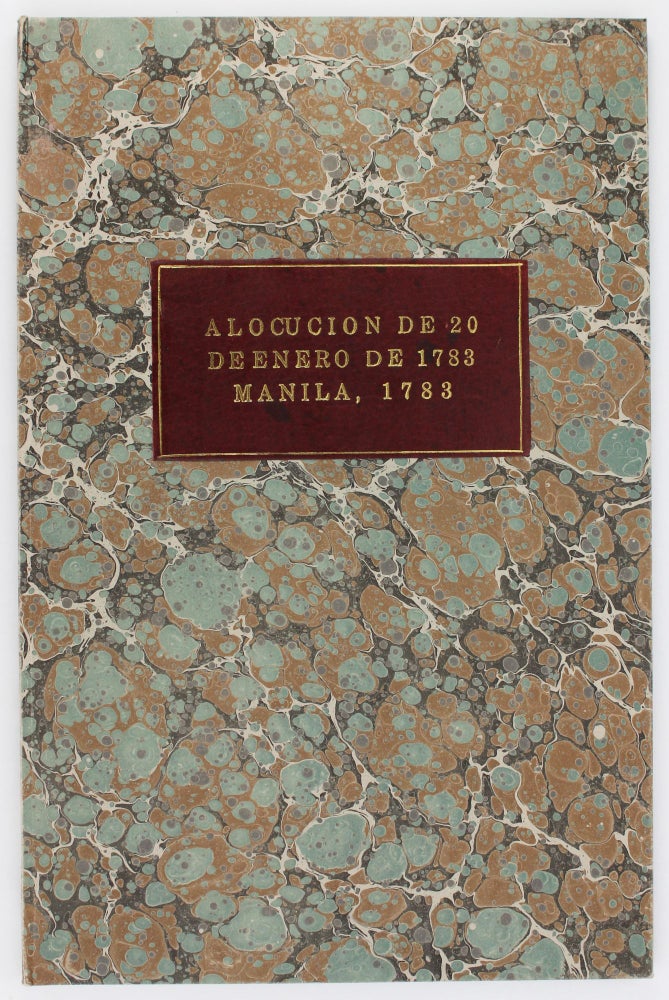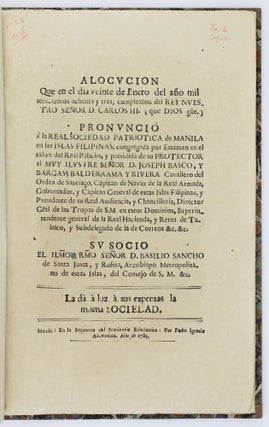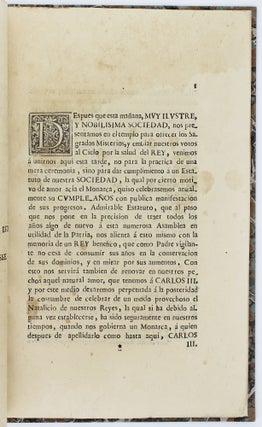Alocucion Que en el Dia Veinte de Enero del Año Mile Setecientos Ochenta y Tres, Cumpleaños del Rey Nuestro Señor D. Carlos III...
Manila: En la Imprenta del Seminario Eclesiastico, 1783. [2],23pp. printed on rice paper. Folio. Modern marbled paper-covered boards, red leather label on front cover stamped in gilt. A few minor paper repairs to edges of a few leaves, a few very small marginal wormholes, not costing any text, typical brown spotting, staining, and minor brittleness peculiar to rice paper. Very good. Item #2495
A rare work printed on the fourth press ever in operation in Manila. After consecration and service in Spain, Sancho de Santa Justa arrived in Manila in 1767 to take up his duties as archbishop, which included overseeing the expulsion of the Jesuits. Sancho de Santa Justa was a native of Aragon and a member of the Society of Scholarum Piarum. In the present work, an address on the occasion of Charles III's sixty-seventh birthday, Sancho de Santa Justa expresses himself no friend of many of the Enlightenment's ideas but reiterates his support of the King, his economic policies, and especially of the newly-instituted practice of free commerce in the Spanish empire. Conversely, he rails against England and its foreign commercial practices, and bemoans its ascension as a maritime powerhouse.
As stated on the title page, the work was pronounced before "la Real Sociedad Patriotica de Manila." That august body met in the Royal Palace and was presided over "de su protector el muy ilustre senor D. Joseph Basco, y Bargas, Balderrama y Rivera cavallero del Orden de Santiago, capitan de navio de la real armada, gobernador, y capitan general de estas Islas Filipinas, y presidente de su real audienca, y chancilleria, director grl de las tropas de S.M. en estos dominios, superintendente general de la Real Hacienda, y Renta de Tabaco, y subdelegado de la de Correos &c. &c."
The work is printed on "rice paper" (i.e. Asian paper probably from the mulberry tree), as was common in Manila during the period to circa 1820. The typography is definitely provincial and plain, using only one decorative woodcut initial and no ornamentation on the titlepage. The type is roman in a variety of sizes, with a practice of using all capitals for emphasis. The press on which this work was printed had been that of the Jesuits until Archbishop Sancho de Santa Justa carried out the King's order and expelled them. He then appropriated the press for his private use, as here. What had been only the fourth press to operate in the Islands, now with a new name, became the fifth.
NUC, OCLC, and COPAC locate only six copies worldwide - the John Carter Brown Library, Indiana University, the Newberry Library, the British Library, the Spanish national library, and one at the national library in the Philippines.
Medina, Manila 317. Retana, Aparato Bibliografico 379.
Price: $6,750.00



